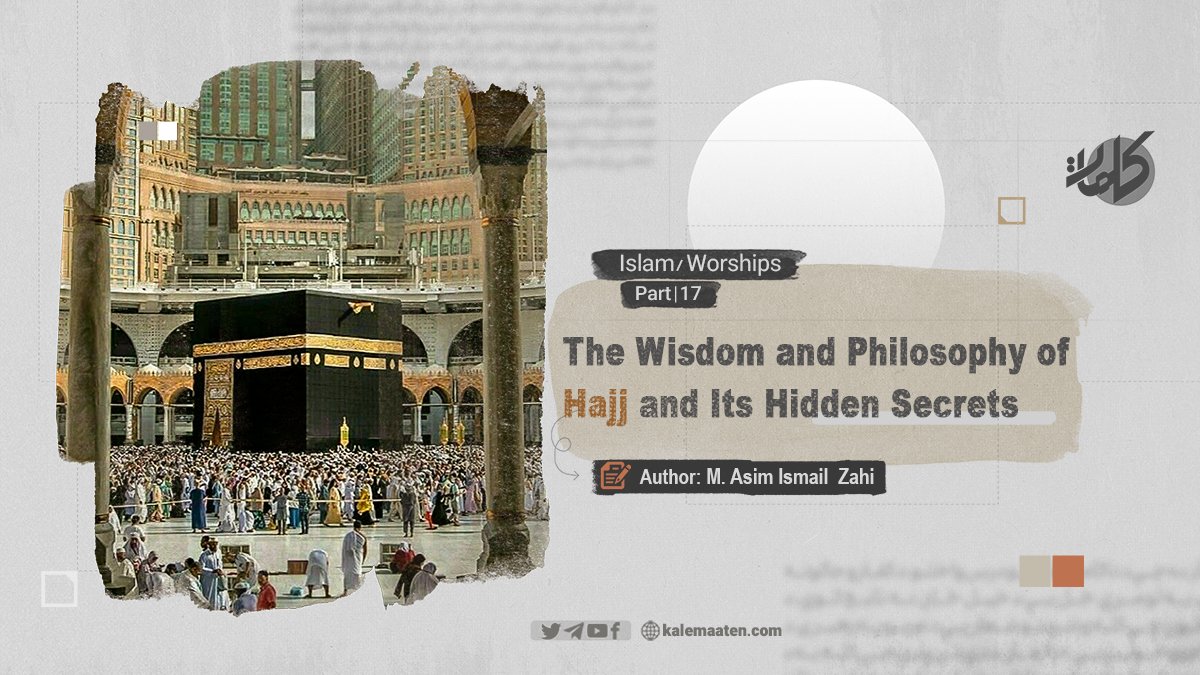
Author: M. Asim Ismail Zahi
The Wisdom and Philosophy of Hajj and Its Hidden Secrets (Part 17)
The second Doubt: Hajj is another form of idolatry.
Explanation of the Doubt
Islamophobes claim that the Prophet of Islam merely changed the form and style of idol worship during Hajj and ‘Umrah. They argue that he instructed his Companions (Sahaba) to Tawaf around the Ka’ba—a large stone structure—, walk between the two hills of Safa and Marwah, and stone the devil using symbolic pebbles. They also question why he commanded them to kiss the Black Stone (Hajar al-Aswad).
Response
How can Hajj be considered a form of idol worship when it’s very purpose is to elevate divine monotheism (Tawhid) and eliminate polytheism (shirk)? For example, the objective behind building the Ka’ba was to abolish polytheism, as Allah the Exalted says: “وَإِذْ بَوَّأْنَا لإِبْرَاهِيمَ مَكَانَ الْبَيْتِ أَنْ لَا تُشْرِكْ بِي شَيْئًا” Translation: “And [mention] when We designated for Abraham the site of the House, [saying], ‘Do not associate anything with Me.’” (Qur’an)
Therefore, the Prophet of Islam expelled all the idols of the polytheists from the Ka’ba and instructed Sayyedna Abu Bakr al-Siddiq to proclaim that no polytheist (Mushrik) would be allowed to perform Hajj anymore: “ألا يحج بعد العام مشرك” “No polytheist shall perform Hajj after this year.”
The Prophet (peace be upon him) also removed the polytheistic phrases that the idolaters used during their Hajj chants.
The Prophet (PBUH) explained the wisdom behind Tawaf: “الطَّوَافُ حَوْلَ الْبَيْتِ مِثْلُ الصَّلَاةِ إِلَّا أَنَّكُمْ تَتَكَلَّمُونَ فِيهِ، فَمَنْ تَكَلَّمَ فِيهِ فَلَا يَتَكَلَّمَنَّ إِلَّا بِخَيْرٍ” Translation: “Tawaf around the House is like prayer, except that you are allowed to speak in it. So, whoever speaks during it should speak only what is good.”
So Tawaf is like prayer, where the Ka’ba only serves as a direction and focal point; neither Tawaf nor prayer is intended for the Ka’ba itself. As it is said: “إِنَّمَا جُعِلَ الطَّوَافُ بِالْبَيْتِ وَبِالصَّفَا وَالْمَرْوَةِ وَرَمْيُ الْجِمَارِ لِإِقَامَةِ ذِكْرِ اللَّهِ عَزَّ وَجَلَّ” “Indeed, Tawaf around the House, walking between Safa and Marwah, and the stoning of the pillars are all established for the remembrance of Allah, the Mighty and Majestic.”
The one performing Tawaf moves his body around the House, but his heart and soul are directed toward the divine presence. With both tongue and heart, he proclaims: “لَبَّيْكَ اللَّهُمَّ لَبَّيْكَ” “Here I am, O Allah, here I am!” And we have never heard anyone say: “لَبَّيْكَ يَا كَعْبَةُ لَبَّيْكَ” “Here I am, O Ka’ba, here I am!” So Tawaf is for Allah, not for the Ka’ba!
Allah the Exalted is the absolute Sovereign and Owner of the House. He has the right to prescribe rules for circumambulating (Tawaf) His House, just as, without comparison, any ruler may dictate the form of military parades for his soldiers.
As for the Black Stone (Hajar al-Aswad), we do not worship it. We love it and kiss it—just as one might kiss their children or spouse. Does that mean we worship them? Of course not.
We love the Black Stone because the Messenger of Allah (PBUH) loved it. If an atheist objects, “Why do you love it?”, we reply: This is a personal matter and has nothing to do with you.
We must understand that the Black Stone brings neither benefit nor harm. As Sayyedna Umar al-Faruq said: “عَنْ عُمَرَ أَنَّهُ جَاءَ إِلَى الْحَجَرِ فَقَبَّلَهُ فَقَالَ: إِنِّي أَعْلَمُ أَنَّكَ حَجَرٌ لَا تَنْفَعُ وَلَا تَضُرُّ، وَلَوْلَا أَنِّي رَأَيْتُ رَسُولَ اللَّهِ ﷺ يُقَبِّلُكَ مَا قَبَّلْتُكَ” Translation: “Indeed, I know that you are only a stone; you neither benefit nor harm. And if I had not seen the Messenger of Allah (PBUH) kiss you, I would not have kissed you.”
Sayyedna Umar’s statement clarifies that kissing the Black Stone is purely an act of devotion. No one should think that the stone has any power of benefit or harm.
Interestingly, even the pre-Islamic Arabs—despite their many forms of polytheism and idolatry—never worshipped the Black Stone.
The wisdom behind walking between Safa and Marwah lies in the story of Lady Hajar and Ismail, who were stranded in a dry, barren valley and desperately searching for water. Hajar ran between these two hills in distress. Likewise, all humans must display their need and humility before Allah in this symbolic act. It teaches reliance (tawakkul) on Allah.
The stoning of the devil (ramy al-Jimar) commemorates the action of Prophet Ibrahim (PBUH), who stoned the devil. It nurtures the spirit of resistance against Satan. After completing Hajj, a person returns home to a lifelong battle against the devil. By recalling the symbolic stoning, he keeps alive the memory of Satan’s enmity and warfare: “إِنَّ الشَّيْطَانَ لَكُمْ عَدُوٌّ فَاتَّخِذُوهُ عَدُوًّا” Translation: “Indeed, Satan is your enemy, so take him as an enemy.” (Qur’an). This training is like the shooting practice soldiers undergo before entering real battles—so they can emerge victorious.
Continues…


